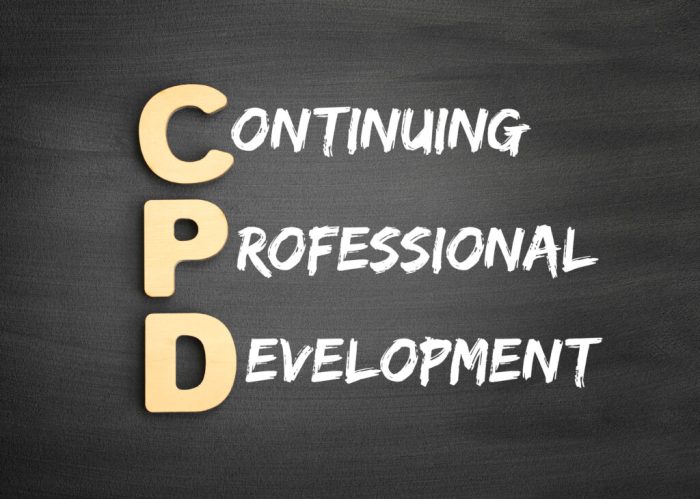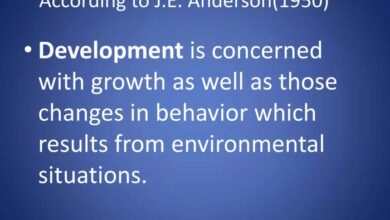
Continuing professional development in accounting is crucial for accountants to stay relevant and proficient in their field. This comprehensive guide delves into the multifaceted world of CPD, exploring its importance, various methods, and future implications for accountants. From regulatory frameworks to emerging technologies, we’ll unpack the vital role CPD plays in maintaining professional competence and career advancement.
Accountants face a constantly evolving landscape, requiring continuous learning and adaptation. This guide will provide a roadmap for understanding the nuances of continuing professional development in accounting, equipping readers with a clear understanding of the standards, requirements, and best practices.
Introduction to Continuing Professional Development (CPD) in Accounting
Continuing professional development (CPD) in accounting is a vital component for maintaining professional competence and ethical standards in the ever-evolving financial landscape. Accountants face a constant barrage of new regulations, technological advancements, and evolving best practices. Staying abreast of these changes is paramount for providing accurate and reliable financial advice, ensuring compliance, and ultimately, contributing to a robust and trustworthy financial system.CPD in accounting is more than just attending workshops; it encompasses a wide range of activities aimed at enhancing knowledge, skills, and professional judgment.
It’s a proactive approach to learning and adapting, essential for navigating the complex challenges and opportunities in the field.
Definition of Continuing Professional Development (CPD) in Accounting
CPD in accounting encompasses a structured and ongoing process of learning and development designed to enhance the professional knowledge, skills, and competence of accountants. It is a commitment to continuous improvement in the field, aiming to meet evolving professional standards and maintain high ethical conduct. This commitment is particularly crucial in a dynamic environment marked by frequent regulatory changes and technological innovations.
Importance of CPD for Accountants
Accountants need to maintain their professional competence and ethical standards. CPD helps them adapt to new regulations, technologies, and best practices, enabling them to provide accurate and reliable financial advice. This is crucial for the protection of clients’ interests and for the integrity of the financial system as a whole. CPD also allows accountants to build on their expertise and advance their careers, staying ahead of industry trends and potentially increasing their value to their firms and clients.
Motivations Behind Accountants Engaging in CPD Activities
Accountants are motivated to engage in CPD for a variety of reasons. These include staying abreast of the latest developments in accounting and finance, maintaining compliance with evolving regulations, enhancing their technical skills, and improving their professional judgment. Additionally, many accountants see CPD as a way to advance their careers, enhance their employability, and build their professional network.
Types of CPD Activities Available to Accountants
Accountants have access to a broad range of CPD activities, catering to various learning styles and preferences. These include formal courses and workshops, online learning platforms, webinars, conferences, and industry publications. CPD activities can also involve mentorship programs, shadowing experienced professionals, and participation in relevant professional organizations.
Key Benefits of CPD for Accounting Professionals
| Benefit | Individual | Firm | Societal |
|---|---|---|---|
| Enhanced Professional Competence | Increased knowledge and skills, leading to improved performance and career advancement. | Improved quality of services provided to clients, increased efficiency, and reduced risk of errors. | Greater accuracy and reliability in financial reporting, contributing to a more stable financial system. |
| Compliance with Regulations | Keeps abreast of changing regulations and standards, minimizing risk of non-compliance. | Ensures firm complies with all relevant regulations, avoiding potential penalties and reputational damage. | Promotes a more compliant financial environment, contributing to a higher level of public trust in financial institutions. |
| Improved Ethical Conduct | Develops strong ethical judgment and decision-making skills. | Creates a culture of ethical conduct within the firm, fostering trust and integrity. | Strengthens ethical standards in the accounting profession, leading to a more responsible and trustworthy financial sector. |
| Career Advancement | Increased knowledge and skills, opening up opportunities for promotions and new roles. | Attracts and retains highly skilled professionals, improving firm reputation and competitive advantage. | Enhances the overall professionalism of the accounting workforce, contributing to a more competent and ethical financial system. |
| Networking Opportunities | Builds professional networks, connecting with other accountants and industry leaders. | Expands the firm’s professional network, providing access to new knowledge and opportunities. | Creates a more interconnected and collaborative accounting community, facilitating knowledge sharing and collaboration. |
CPD Requirements and Standards in Accounting
Navigating the world of accounting demands continuous learning and skill enhancement. Staying abreast of evolving regulations, technological advancements, and best practices is crucial for maintaining professional competence and ethical conduct. This continuous professional development (CPD) is not just a formality; it’s an integral part of ensuring the accuracy, reliability, and integrity of financial information. CPD requirements in accounting are rigorously defined and enforced to uphold these standards.CPD requirements are not uniform across all jurisdictions.
Different accounting bodies and regulatory frameworks have their own specific standards, reflecting the unique needs and challenges of various markets. These standards dictate the types of activities that count towards CPD, the duration of training required, and the methods for demonstrating compliance. Understanding these diverse standards is essential for accountants working internationally or in multiple jurisdictions.
Regulatory Frameworks and Professional Bodies
Various regulatory bodies and professional accounting organizations globally oversee CPD for accountants. These organizations establish and enforce standards to ensure a high level of competence among their members. Examples include the American Institute of Certified Public Accountants (AICPA), the Institute of Chartered Accountants in England and Wales (ICAEW), and the Institute of Internal Auditors (IIA). Each body has its own specific framework and requirements.
Staying sharp in accounting means constant learning. Continuing professional development (CPD) is crucial, but sometimes we get stuck in the same old routines. Maybe we could learn a thing or two from how tech firms are innovating, like the lessons in adaptability and rapid learning that what tech firms could teach obama highlights. Ultimately, CPD in accounting needs to be more proactive, embracing new technologies and strategies to stay ahead of the curve.
Specific CPD Requirements and Standards, Continuing professional development in accounting
CPD requirements vary significantly depending on the accounting body. For instance, the AICPA mandates a certain number of continuing education credits annually for maintaining certification. The ICAEW requires accountants to engage in a diverse range of activities, including technical courses, workshops, and practical experience. These requirements often encompass various accounting specializations, such as auditing, taxation, and financial reporting.
These requirements are tailored to ensure the specific knowledge and skills are maintained for each specialization.
Comparative Analysis of CPD Standards
A comparative analysis of CPD standards across different jurisdictions reveals variations in the required hours of training, the types of activities accredited, and the methods for documenting and reporting compliance. For example, some jurisdictions might prioritize specific technical areas like financial reporting, while others might focus on broader aspects of business acumen. The requirements are influenced by the complexity of the local financial environment and the needs of the local businesses.
Recognizing these variations is vital for accountants working in international settings.
Mechanisms for Ensuring Compliance
Various mechanisms exist to ensure compliance with CPD requirements. These include mandatory reporting by accountants, regular audits by professional bodies, and penalties for non-compliance. This ensures that accountants maintain their skills and knowledge and upholds the integrity of the profession. Clear documentation of CPD activities and regular self-assessment are crucial for meeting the compliance standards.
CPD Requirements for Different Accounting Specializations
| Accounting Specialization | Required CPD Hours (Example) | Specific Training Areas |
|---|---|---|
| Auditing | 50 hours annually | Internal controls, fraud detection, auditing standards |
| Taxation | 40 hours annually | Tax laws, regulations, compliance procedures |
| Financial Reporting | 60 hours annually | Financial statement analysis, IFRS/GAAP standards, accounting principles |
This table provides a simplified overview. The exact requirements vary significantly depending on the specific accounting body and jurisdiction. Detailed information should be sought directly from the relevant professional accounting organization.
Methods and Approaches to CPD in Accounting

Continuing Professional Development (CPD) is crucial for accountants to maintain their skills and knowledge in a rapidly evolving field. This involves staying abreast of changes in regulations, technology, and best practices, ensuring they can provide accurate and up-to-date services to clients. Effective CPD methods are vital to achieving these goals.CPD encompasses a range of methods, from traditional workshops to cutting-edge online learning platforms.
Staying sharp in accounting means constant learning. Continuing professional development (CPD) is crucial, and honestly, it can feel like a chore sometimes. But think about it like this: if a company like Microsoft, as highlighted in this insightful piece about former employee to microsoft youre doing it wrong , can benefit from internal critiques, then accountants should be equally focused on staying updated with the latest industry trends and regulations.
CPD isn’t just about keeping your skills current, it’s about staying ahead of the curve.
These approaches cater to different learning styles and professional needs, ultimately empowering accountants to excel in their roles.
Various Methods of CPD
A diverse array of methods facilitate CPD, each with its own advantages and disadvantages. These methods include workshops, seminars, online courses, and self-study materials. Effective CPD programs often combine multiple methods to provide a comprehensive learning experience.
- Workshops and Seminars: These interactive sessions provide focused training on specific accounting topics. They offer opportunities for networking and direct interaction with industry experts, leading to a deeper understanding of the subject matter. For instance, a workshop on IFRS updates can equip accountants with the knowledge to apply the latest standards in their daily work.
- Online Courses: Online learning platforms provide flexibility and accessibility, allowing accountants to learn at their own pace and convenience. These courses often offer modules covering various accounting specializations, enabling professionals to tailor their learning to their specific needs. Examples include interactive simulations, downloadable resources, and expert-led video tutorials.
- Self-Study Materials: These resources, including books, journals, and articles, allow accountants to engage in independent learning. They can delve deeper into specific areas of interest and supplement formal training. This approach is highly cost-effective and provides continuous learning opportunities outside of structured programs.
Technology’s Role in CPD
Technology plays a pivotal role in enhancing CPD opportunities for accountants. Online platforms, digital libraries, and accounting software updates enable continuous learning and skill development. This digital evolution empowers accountants to stay updated on industry trends and maintain a competitive edge.
- Online Learning Platforms: These platforms offer interactive modules, assessments, and forums, facilitating collaborative learning. They also often incorporate gamification elements to enhance engagement and knowledge retention.
- Digital Libraries: Access to online journals, publications, and industry-specific databases allows accountants to stay updated on the latest developments and best practices.
- Accounting Software Updates: Software providers regularly update their products to incorporate new accounting standards and technological advancements. These updates are crucial for accountants to maintain proficiency in using the latest tools and features.
Different Approaches to CPD
Structured learning paths, mentorship programs, and peer learning initiatives are valuable approaches to accounting CPD. They provide tailored support and foster a collaborative learning environment.
- Structured Learning Paths: These programs offer a well-defined curriculum for accountants to follow, leading to professional certifications or higher-level qualifications. Structured paths ensure a consistent progression in knowledge and skills, which can be tailored to specific career goals.
- Mentorship Programs: Experienced accountants can guide and support junior colleagues, sharing their knowledge and expertise. Mentorship fosters professional development and career advancement, enabling junior accountants to learn from industry veterans.
- Peer Learning Initiatives: Collaborative learning groups and forums enable accountants to exchange ideas, discuss challenges, and learn from each other’s experiences. This approach fosters a supportive environment for continuous learning and knowledge sharing.
Designing an Effective CPD Program
Designing an effective CPD program for accounting professionals requires careful consideration of several factors. This involves understanding the needs and preferences of the target audience, selecting appropriate methods, and measuring the program’s effectiveness.
- Needs Assessment: Understanding the specific needs and learning styles of accounting professionals is crucial. This includes identifying knowledge gaps, skill deficiencies, and desired areas of improvement.
- Program Design: The design should incorporate a variety of methods, ensuring relevance and accessibility. The program should also align with the professional’s career goals.
- Evaluation and Feedback: Regular evaluation of the program’s effectiveness and gathering feedback from participants is essential for continuous improvement. This iterative process allows adjustments to be made based on performance data and participant input.
Comparison of CPD Methods
| CPD Method | Pros | Cons |
|---|---|---|
| Workshops/Seminars | Interactive, networking opportunities, expert insights | Limited flexibility, potentially expensive |
| Online Courses | Flexible, accessible, cost-effective | Requires self-discipline, limited interaction |
| Self-Study Materials | Highly cost-effective, flexible | Requires self-motivation, may lack structure |
CPD Topics and Content in Accounting: Continuing Professional Development In Accounting
Continuing Professional Development (CPD) in accounting is crucial for maintaining expertise and relevance in a dynamic field. This necessitates a focus on emerging trends, ethical considerations, and practical application. CPD programs must equip professionals with the tools to navigate evolving accounting standards, regulations, and technological advancements. This includes covering essential technical skills and industry best practices.CPD programs in accounting should be tailored to meet the specific needs of different accounting roles and levels of experience.
A robust program will offer a variety of learning methods, from interactive workshops to online modules, to cater to diverse learning styles. This flexibility ensures that professionals can acquire knowledge and skills in a manner that suits their individual needs.
Emerging Trends and Relevant Topics
Accounting professionals must stay abreast of evolving technologies and industry trends. Cloud computing, data analytics, artificial intelligence, and blockchain are reshaping the accounting landscape. CPD programs should incorporate these developments to enhance professionals’ ability to adapt and thrive in this changing environment. Furthermore, a growing focus on sustainability reporting and ESG (environmental, social, and governance) factors necessitates incorporating these topics into CPD curricula.
Technical Skills and Best Practices
CPD programs should prioritize building and enhancing technical skills. Understanding and applying current accounting standards (e.g., IFRS, US GAAP) is paramount. CPD programs must also address best practices in financial reporting, taxation, auditing, and internal controls. This ensures professionals can deliver accurate, reliable, and compliant financial information. Furthermore, understanding industry best practices for risk management and internal controls is essential.
Ethical Considerations
Ethical considerations are paramount in accounting. CPD programs must include modules focusing on professional ethics, codes of conduct, and the importance of integrity and objectivity in financial reporting. Case studies and discussions of real-world ethical dilemmas can illustrate the application of ethical principles in practical scenarios. Discussions about the impact of technology on ethical decision-making are also necessary.
Addressing Current Accounting Standards, Regulations, and Technological Advancements
CPD programs should address changes in accounting standards, regulations, and technological advancements. Regular updates on IFRS, US GAAP, and relevant tax laws are essential. CPD programs should also cover the impact of technological advancements, such as cloud accounting software and data analytics tools, on accounting practices. This proactive approach ensures professionals are equipped to navigate evolving regulatory landscapes and leverage technology effectively.
Specific CPD Topics
| Topic | Learning Objectives | Suggested Learning Materials |
|---|---|---|
| Financial Reporting | Understand and apply current financial reporting standards. Develop skills in preparing financial statements, analyzing financial data, and identifying potential reporting issues. | IFRS and US GAAP publications, financial statement analysis textbooks, case studies, and software simulations. |
| Taxation | Stay updated on current tax laws and regulations. Develop skills in tax planning, compliance, and research. | Tax codes, relevant case law, tax planning guides, and software tools for tax calculation and compliance. |
| Auditing | Apply auditing standards and procedures. Develop skills in risk assessment, evidence gathering, and reporting findings. | Auditing standards, auditing textbooks, case studies, and practical simulations. |
| Forensic Accounting | Understand and apply forensic accounting principles and techniques. Develop skills in fraud detection, investigation, and litigation support. | Forensic accounting textbooks, case studies, and training on specific software tools used for fraud detection. |
CPD Impact on Accounting Practice and Career Development
Continuing Professional Development (CPD) is no longer a mere formality in accounting; it’s a cornerstone of professional growth and success. In today’s dynamic business environment, staying abreast of evolving regulations, technological advancements, and best practices is crucial for accountants to provide valuable services and advance their careers. This section explores the profound impact CPD has on enhancing accounting practice and career progression.CPD significantly enhances the skills and knowledge base of accountants.
It equips them with the latest industry trends, regulatory changes, and technological tools, thereby enabling them to provide more accurate and efficient services. This continuous learning fosters a deeper understanding of accounting principles and practices, allowing accountants to tackle complex issues with greater confidence and expertise.
Impact on Enhancing Skills and Knowledge
CPD programs offer a wide array of learning opportunities, including workshops, seminars, webinars, and online courses. These activities expose accountants to diverse perspectives, cutting-edge methodologies, and practical applications of accounting principles. Exposure to these resources strengthens their theoretical knowledge and enhances their practical skills, thereby improving their overall professional capabilities.
Contribution to Improved Decision-Making, Problem-Solving, and Client Service
CPD directly contributes to improved decision-making, problem-solving, and client service. Accountants equipped with updated knowledge and skills are better positioned to analyze complex financial situations, identify potential risks, and develop effective solutions. This translates into more informed decisions, leading to improved financial outcomes for clients and organizations. Enhanced problem-solving skills also improve client interactions and build trust.
Superior client service is often a direct result of accountants’ proactive engagement with clients, their proactive identification of their clients’ needs, and their responsiveness to their clients’ questions.
Correlation Between CPD Participation and Career Advancement Opportunities
CPD participation is directly correlated with career advancement opportunities. Employers value professionals who demonstrate a commitment to continuous learning and skill development. CPD activities demonstrate a dedication to professional growth and highlight an individual’s commitment to staying current with industry best practices, which is essential in the current competitive job market. This commitment to continuous learning can lead to promotions, increased responsibilities, and higher compensation.
Examples of How CPD Has Helped Accountants Improve Their Professional Practice
Numerous accountants have reported significant improvements in their professional practice as a direct result of CPD participation. For instance, an accountant who attended a workshop on financial statement analysis was able to identify a critical error in a client’s financial reporting, preventing a potential financial loss for the client. Another accountant who participated in a data analytics course developed sophisticated financial models to better advise clients on investment strategies.
These examples demonstrate how CPD can lead to improved decision-making and increased value to clients.
Link Between CPD Activities, Skill Enhancement, and Career Progression
| CPD Activity | Skill Enhancement | Career Progression |
|---|---|---|
| Attending seminars on tax regulations | Improved understanding of tax laws and regulations, enhanced tax compliance expertise | Increased credibility and expertise as a tax advisor, potential for promotion to senior tax roles |
| Participating in workshops on financial modeling | Enhanced proficiency in financial modeling techniques, improved ability to develop complex financial projections | Increased value as a financial advisor, potential for promotion to financial analyst roles |
| Completing online courses on data analytics | Improved data analysis skills, enhanced ability to identify trends and patterns in financial data | Increased opportunities to contribute to strategic decision-making, potential for promotion to data analyst or business intelligence roles |
| Networking at industry conferences | Expanded professional network, exposure to new ideas and perspectives | Increased visibility within the industry, potential for mentorship opportunities, new business partnerships |
CPD and Technological Advancements in Accounting
Staying relevant in the ever-evolving accounting field demands continuous learning and adaptation. Technological advancements are rapidly transforming accounting practices, necessitating a shift in the way professionals approach Continuing Professional Development (CPD). This section explores the impact of technology on CPD requirements, showcasing how programs can effectively integrate emerging technologies like AI, data analytics, and cloud computing. It also demonstrates how CPD can enhance digital skills and equip accountants for the future.CPD programs must now equip accountants with the digital tools and skills necessary to thrive in the modern workplace.
The incorporation of technology into accounting practice has created a need for specific training in using these tools effectively and ethically.
Impact of Technological Advancements on CPD Requirements
Technological advancements are significantly altering the skillsets required of accountants. Traditional CPD focused largely on manual processes and regulatory changes. However, the integration of AI, data analytics, and cloud computing necessitates a focus on digital literacy, data interpretation, and the ethical implications of these technologies.
Adapting CPD Programs to Emerging Technologies
CPD programs must adapt to the evolving landscape by incorporating training modules on AI, data analytics, and cloud computing. This includes practical exercises, case studies, and real-world applications to equip accountants with hands-on experience. Learning platforms should be designed to facilitate interactive learning, offering flexible and accessible resources for professionals to stay updated.
Examples of CPD Programs Incorporating Technological Advancements
Numerous CPD programs are already incorporating technology. Some programs offer workshops on data visualization using tools like Tableau or Power BI. Others include modules on cloud-based accounting software, such as QuickBooks Online or Xero. Furthermore, some organizations are integrating AI-based tools into their training modules, helping accountants understand and apply these technologies in their work. There’s a growing trend of programs that provide certifications in data analytics and machine learning.
Enhancing Digital Skills of Accountants Through CPD
CPD programs can effectively enhance the digital skills of accountants by offering specialized courses. For instance, training on data analysis tools and techniques is crucial to make accountants adept at interpreting complex data sets. Learning how to use cloud-based accounting software will streamline their work and improve efficiency. CPD programs can help accountants understand the ethical implications of technology, particularly regarding data privacy and security.
Comparing Traditional and Modern CPD Programs
| Feature | Traditional CPD Programs | Modern CPD Programs |
|---|---|---|
| Focus | Regulations, manual processes | Technology, data analysis, AI, cloud computing |
| Learning Methods | Seminars, lectures, textbooks | Interactive workshops, simulations, online platforms, hands-on projects |
| Skills Developed | Compliance, bookkeeping | Digital literacy, data interpretation, AI application, cloud computing skills |
| Tools Utilized | Spreadsheets, calculators | Data analytics software, AI tools, cloud-based accounting software |
| CPD Format | Often limited to in-person sessions | More flexible, often with online options |
CPD and Ethical Considerations in Accounting
Continuing Professional Development (CPD) in accounting isn’t just about staying current with evolving regulations and technologies; it’s also fundamentally about upholding the highest ethical standards. Ethical conduct is intrinsic to the accounting profession, and CPD programs must actively cultivate and reinforce these principles. Accountants play a critical role in safeguarding financial integrity, and their ethical compass should be consistently honed through ongoing learning.CPD programs provide a structured framework for accountants to reflect on their ethical responsibilities and develop a deeper understanding of the ethical challenges they may encounter in their professional lives.
This involves not only understanding the rules but also internalizing the values that underpin sound ethical decision-making.
Significance of Ethical Considerations in CPD Programs
CPD programs in accounting must incorporate ethical considerations to ensure that accountants are equipped to navigate complex situations with integrity and professionalism. Ethical awareness isn’t a one-time event but a continuous process of learning and self-improvement. CPD can foster a culture of ethical responsibility, strengthening the overall integrity of the accounting profession.
How CPD Promotes Ethical Conduct and Professional Integrity
CPD programs can significantly promote ethical conduct and professional integrity by offering training modules focused on ethical frameworks, case studies of ethical dilemmas, and discussions of professional codes of conduct. These elements allow accountants to develop a strong understanding of ethical principles, which can be applied to various situations. CPD also fosters a community of ethical practice, where accountants can share experiences and learn from each other.
Examples of Ethical Dilemmas and CPD Solutions
Accountants frequently face ethical dilemmas, including conflicts of interest, pressure to manipulate financial statements, and concerns about non-compliance with regulations. CPD programs can equip accountants with the tools to identify and resolve these conflicts effectively. For instance, a case study might present a scenario where an accountant is pressured by a client to misrepresent financial data. CPD training could help the accountant understand the implications of such actions, identify the relevant ethical principles (such as honesty and objectivity), and develop strategies for effectively navigating the situation.
By providing real-world examples and exploring different perspectives, CPD can empower accountants to make principled decisions.
Staying sharp in accounting means more than just balancing the books. Continuing professional development is crucial, especially as technology evolves. Think about the legal implications surrounding automated transportation, like the rapidly developing field of autonomous vehicles. Understanding the legal framework, as explored in articles like the law and your robot chauffeur , is vital. It’s about adapting to new challenges and keeping your accounting skills relevant in a world of constant change.
Importance of Ongoing Ethical Training Within CPD Programs
Ongoing ethical training within CPD programs is crucial. Ethical standards and professional conduct are not static. Changes in legislation, market conditions, and business practices can create new challenges. CPD should address these developments through regular updates and refresher courses. A consistent emphasis on ethics ensures that accountants maintain a high level of ethical awareness and competency throughout their careers.
Key Ethical Principles and CPD Activities
| Ethical Principle | Relevance to CPD Activities |
|---|---|
| Integrity | CPD programs should include modules on honesty, truthfulness, and transparency in financial reporting. This might include case studies of financial fraud and discussions of the consequences. |
| Objectivity | CPD programs should emphasize the importance of impartiality and unbiased judgment in accounting processes. This could involve simulations of situations where objectivity is challenged, such as evaluating investments with potential conflicts of interest. |
| Professional Competence and Due Care | CPD should cover up-to-date accounting standards and regulations. This includes training on new technologies and their application in financial reporting. Case studies of professional negligence could also be beneficial. |
| Confidentiality | CPD programs should address the importance of maintaining client confidentiality. Training on data privacy and security measures is vital. This might include practical exercises on handling sensitive information. |
| Professional Behavior | CPD programs should cultivate respect, fairness, and responsibility in professional interactions. This could involve role-playing scenarios to practice appropriate communication and conduct in challenging situations. |
CPD and the Future of the Accounting Profession

Continuing Professional Development (CPD) is no longer a desirable add-on but a crucial element for accountants navigating the evolving accounting landscape. The future of accounting is intertwined with technological advancements, globalisation, and ever-changing regulatory frameworks. CPD plays a pivotal role in equipping accountants with the necessary skills and knowledge to adapt to these dynamic changes.CPD is no longer just about maintaining existing knowledge; it’s about proactively acquiring new skills and understanding emerging trends.
This proactive approach ensures accountants remain relevant and valuable in their roles, fostering a strong foundation for future success. A commitment to ongoing learning is paramount for accountants seeking to thrive in a profession undergoing significant transformations.
Future Role of CPD in Accounting
CPD will become increasingly vital in shaping the future accounting professional. It will move beyond simply covering regulatory updates to encompass the broader skills needed for a dynamic, data-driven profession. This evolution necessitates a focus on developing adaptability, critical thinking, and technological literacy in accounting professionals. The integration of technology in accounting practices demands CPD programs to equip accountants with the tools and skills necessary to embrace these innovations effectively.
Adapting to Future Changes in Accounting
CPD programs can significantly aid accountants in adapting to future changes. These programs should address the growing importance of data analysis, artificial intelligence, and automation in accounting processes. By equipping accountants with the ability to leverage these technologies, CPD fosters adaptability to evolving industry requirements. For example, CPD programs can include modules on data visualization, machine learning, and robotic process automation (RPA) to enable accountants to effectively integrate these tools into their workflows.
Examples of CPD Programs Supporting Professional Development
CPD programs can provide accountants with a variety of support mechanisms. These include:
- Workshops and seminars on emerging technologies: Hands-on workshops and seminars on using new accounting software and emerging technologies like blockchain and cloud computing, empowering accountants to adapt to technological shifts.
- Interactive learning modules on data analysis: CPD programs can incorporate interactive modules on data analysis techniques and tools. These modules would focus on extracting insights from large datasets and interpreting the data to support better decision-making.
- Mentorship programs connecting experienced accountants with those new to the profession: Mentorship programs can provide invaluable support and guidance, ensuring a smooth transition into the evolving accounting landscape.
Emerging Skills and Knowledge Areas
CPD programs must adapt to meet the growing demands of the profession. These programs must incorporate:
- Data analysis and interpretation: The ability to collect, analyze, and interpret data is becoming increasingly critical. CPD programs should emphasize practical applications of statistical tools and techniques in accounting.
- Artificial intelligence and machine learning: Understanding the role of AI and machine learning in accounting tasks and how to integrate these tools effectively into daily operations is essential.
- Cybersecurity and data protection: Protecting sensitive financial data is crucial. CPD programs should include modules on cybersecurity best practices and data protection regulations.
Future Trends in Accounting and CPD Responses
CPD programs must adapt to keep pace with these trends to ensure accountants remain relevant and valuable. This table Artikels potential future trends and the corresponding CPD responses.
| Future Trend | CPD Response |
|---|---|
| Rise of AI and automation | CPD programs should include modules on AI tools and their applications in accounting, training on integrating AI into workflows, and developing skills to analyze and interpret AI-generated reports. |
| Increased data security concerns | CPD should incorporate training on cybersecurity best practices, data protection regulations, and risk assessment in accounting systems. |
| Globalisation and cross-border transactions | CPD programs should cover international accounting standards, cross-border transaction procedures, and relevant regulatory frameworks for international business. |
| Emphasis on ethical considerations | CPD programs should incorporate modules on ethical decision-making, professional conduct, and corporate social responsibility. |
Closure
In conclusion, continuing professional development in accounting is not just a requirement, but a necessity for success in this dynamic field. By understanding the various aspects discussed – from the fundamentals of CPD to the implications of emerging technologies – accountants can proactively shape their careers and contribute to a more proficient and ethical profession. CPD empowers accountants to navigate the future of accounting with confidence and competence.






